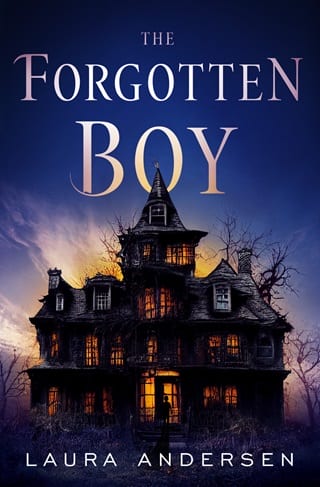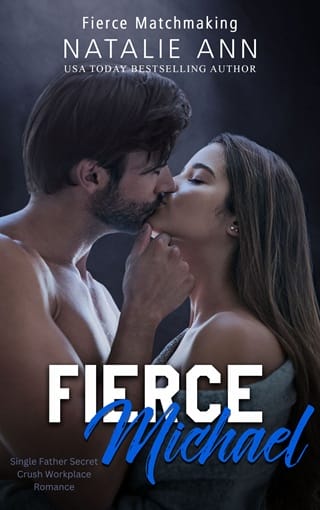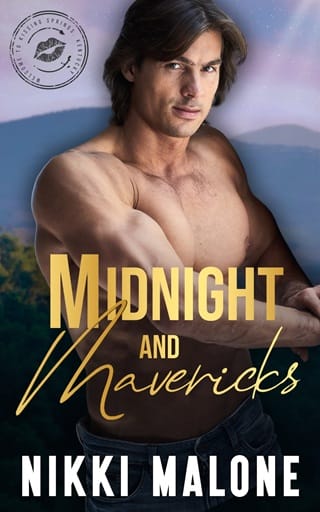Chapter Seventeen
CHAPTER SEVENTEEN
JULIET 2018
Only when the sun had risen in a watery blue sky did Juliet open her bedroom door, an event that required moving a desk, a chair, and the suitcase that she had shoved in front of it.
She didn't know why she thought any of that would stop a ghost.
Maybe he was a polite ghost, though, because the rest of the night had passed without any incident except those imagined in Juliet's head. She'd never been so aware of the sounds an empty house could make. And ten thousand square feet of house only amplified the sounds, and the fear.
She'd very nearly broken down and called Noah Bennett. Which might be considered progress, considering she hadn't thought about calling a man other than Duncan in ten years. But she'd had enough self-preservation not to call a good-looking man in the middle of the night and say, "Sorry to wake you, but I saw a ghost in the corridor. Or possibly I'm hallucinating my own dead son."
When in a state of rattled exhaustion, start with food and coffee . Juliet gratefully toasted some of Rachel's homemade bread. And after three cups of coffee, her head had cleared enough to make a to-do list:
1. Pull myself together before Noah arrives.
2. Ask him about noises in the furnace and water pipes.
3. Get him to tell me about the Havencross ghost.
4. Find my makeup.
5. Destroy this list so as not to humiliate myself.
Starting from the bottom up, within thirty minutes Juliet had changed into a pair of velvet leggings and an oversized cashmere sweater, had brushed her hair, and had applied concealer, mascara, and lipstick. It was the longest she'd looked at herself in the mirror in months, and she was glad to note that the pregnancy weight, compounded by depression eating, had begun to drop off. Her olive-toned skin no longer looked sallow, and her dark hair had something of the same sheen to it that she'd seen in the photos of a young Clarissa Somersby.
Once ready, she set up in the cavernous Victorian kitchen with the scrapbook of Thomas Somersby's disappearance and her notebook—it was either pretend to do research or sit on the front steps like a teenage girl waiting for her first date.
The thing about being a historian was that even pretending to research could easily turn into the real thing. It only took one tidbit to catch the imagination—usually buried in a mass of details. Gradually Juliet compiled a timeline.
Sir Wilfred Somersby had passed Christmas and New Year's at Havencross with his second wife, Sylvia, their two daughters and baby son (ages four, three, and one), and the children of his first wife, thirteen-year-old Clarissa and nine-year-old Thomas. Also present for the holidays were two of his sisters with their husbands and children. A grand total of six adults and sixteen children.
It seemed their planned departure had been hastened by an oncoming blizzard and the threat of the bridge being flooded over. Reading between the lines of the local news stories, Juliet got a strong impression of an unruly scene: the North's early sunset mixed with heavy clouds and rapidly increasing snowfall, almost four dozen people (counting the servants), horses being harnessed to carriages, children being loaded separately from parents, too many people shouting too many orders with too little organization …
Only when the last of the carriages arrived at a Newcastle inn was it discovered that Thomas had been left behind. As at least five servants had remained at Havencross, so it was assumed the boy would be petted and spoiled. How he would enjoy being the only child there until the weather cleared.
It was three days before anyone realized that Thomas was not at Havencross. Or at least, not in the house. Searches were set up, and every foot of ground for five miles around was scoured. The only thing they found was a single shoe, on the banks of the high-rushing river.
By keeping a severe focus on her note-taking, Juliet avoided losing herself in the pathos of the lost boy. This was research , she reminded herself. And if she intended to write about the influenza epidemic at the boys' school, she'd have to get used to reading about suffering children.
An editorial published three weeks after the search had been suspended offered the intriguing tidbit Juliet had been hoping for.
Odd happenings are not new to Havencross. The estate passed rapidly through various families from the days of the first Elizabeth until the end of the eighteenth century when it lay empty for decades. All properties of great age accumulate ghosts—at Havencross, it is said to be the spirit of a young boy. Supposedly he haunts both the house and the grounds, though he is reported to be of a mild nature.
Juliet was scribbling down notes rapidly, already wondering how she could weave this into her research, when she heard footsteps followed immediately by Noah Bennett's voice.
"Are you home?" he asked rhetorically, since he already stood in the kitchen doorway. "I used the knocker on the front door but figured you'd never hear it if you weren't nearby. But then you didn't seem to hear me knocking on the scullery door either."
She stood up too quickly, nearly knocking over her chair. "Sorry! I get this way when I'm reading. Or researching. You could set off fireworks behind me and I'd never notice, so my husband always said. Ex-husband."
Shit. So much for doing her makeup and impressing Noah—he'd been here twenty seconds and she'd already babbled about her failed marriage. She wouldn't be surprised if he walked straight back out the way he'd come.
But he just said, "Enviable trait. I have to wear noise--cancelling headphones if I want to concentrate for more than fifteen minutes at a time. More research about the school?"
"Not directly. I was reading the news clippings about Thomas Somersby's disappearance in 1907. Most of them refer to the ghost boy of Havencross, the one your great-aunt says might date back to the Wars of the Roses, but one of the reporters also talked about tunnels constructed by the original medieval priory. They were supposedly used as hideouts or escape routes during the Scottish wars, and I'd like to look into that. Secret tunnels could easily provide answers to some supposed hauntings."
"Absolutely. And secret passageways. Havencross supposedly has some of those."
Juliet felt a chill at the base of her neck. She was already living entirely alone in a house with more rooms than she'd bothered to count and at least three staircases—did there really have to be hidden passages for her to worry about?
Not that ghosts need hidden passages , she reminded herself.
Not that ghosts are real , she shot back at herself.
Anxious to change the subject, Juliet asked abruptly, "Did you need to look at the furnace? Water heater? Or whatever it is you're here for. I don't really know what a surveyor does."
A different man—Duncan—would have taken offense. At her words, at her tone, at something only he could discern that was wrong in her.
Noah just laughed. "I wouldn't say heating and plumbing make up the bulk of my work, but having grown up in an old farmhouse I have plenty of experience troubleshooting. I'll be glad to take a look at the furnace."
Although she wanted nothing more than to flee, Juliet tagged along when Noah invited her. Maybe pretending to be fascinated by heating systems would shake her into normal behavior.
In the end she admitted that it was more interesting than she would have guessed. (She would have guessed she'd have less than a zero-percent interest, so it was a pretty low bar to clear.) The heating system hadn't been updated yet, and the Edwardian boiler that squatted in the cellar could have been an alien species from some sci-fi movie. Noah talked her through the basics of how it operated and showed her how to restart it if necessary.
"Of course, the advantage to old houses is that you have an abundance of fireplaces," Noah added. "I'll get Rachel's boys to help me bring a load of firewood to stack in the scullery. Worse comes to worst, do you know how to start a fire?"
"Uhhh …"
"I'll teach you."
She eyed him skeptically. "That can't possibly be part of your surveying job."
"No, but if I let you freeze to death, then I can't ever get you to go out with me."
Wait … what?
The only reason Juliet didn't instantly combust was that Noah didn't stop to judge the effect of his words. He just kept on with what he was doing. "Let's take a look at the electrical while we're down here. That's something you're very likely to lose in a bad storm."
He flashed a grin at her over his shoulder. "And yes, I am going to make sure you have plenty of torches and batteries and candles at hand. It's simply logical to make all the preparations you can."
Logic. Duncan hadn't been much for logic. He'd had the ability to completely contradict himself within two minutes without the slightest acknowledgment that he'd done so. And when Juliet pointed out such a lapse in his logic—usually having to do with her behavior—he'd either fly into a fury and accuse her of undermining him, or look at her blankly and flat-out deny one or the other of his statements. There'd been times Juliet had wanted to record him for later proof, but she figured even that wouldn't help. It would just hand Duncan one more weapon to use against her.
And the sad part was, Juliet had begun to doubt her own instincts.
Also unlike Duncan, Noah didn't seem anxious to press her for a response. Not that he'd actually asked her anything. Yet. What would she say if and when he did? By the time Noah had showed her how to reset the electricity (much simpler, since even she could recognize a fuse box) her nerves had settled and Noah had her talking about her career.
As they climbed up from the cellar, she even felt comfortable enough to say, "An adjunct professor isn't much of a career. You're the lowest of the low in academic departments, although no university could teach its students without adjuncts."
"I get that—but don't tell me it's adjunct teaching or academic infighting that you care about. You didn't come to the farm and charm Aunt Winnie and drag boxes from our attic just because it will make you look better in a job interview. I saw your face. Whatever it is about Havencross that's caught your attention, it shines out of your eyes. That's what I want to hear about."
When was the last time anyone had asked her what she loved? Almost shyly, Juliet said, "It's people that I like, knowing about people in the past. How they lived, what they talked about, the things that frightened them and made them happy. History is just people. We've organized it into dates and politics and wars and governments, but in the end it's all just people making choices, making mistakes, hating and loving just like we do." She caught herself and cleared her throat. "Anyway, Havencross is a beautiful building, but I want to know about the people who lived in it. Especially the boys and staff who were here in 1918. The war is dragging to an end, life is supposed to be getting back to normal, and bam! Out of nowhere a virus explodes and rocks their whole world. That's the story I thought I'd write. Except …"
She hesitated. Tell him about the ghostly links or not?
"Except what?" Noah prodded.
"Except, just like all history, the 1918 flu isn't a discrete event. It had influences from the past woven in. One of them seems to be the disappearance of Thomas Somersby in 1907. And the stories of his disappearance talk a lot about the ghost boy of Havencross."
He shot her a sharp and knowing look. "You've been listening to Aunt Winnie. What did she tell you about me and the ghost boy?"
"Just that I should ask you about him. Sometime."
With a wry smile—how many different smiles did he have?—Noah said, "No time like the present, I suppose." He cast a look around the cellar and blew out his breath in a way that made Juliet's throat catch. "If I'm going to tell you a ghost story, this isn't the place for it. Can we go to the medieval part of the house?"
Where her bedroom was. Where she'd seen … whatever it was she'd seen last night. "Sure."
Something about traipsing through the vast ground floor and up the dramatic Gothic staircase made Juliet very aware of the house's size and emptiness. She'd managed thus far to keep her attention focused only on her immediate surroundings in Havencross, and wondered if she'd be able to sleep at night if this new awareness stayed with her. All of that space—with only her own breath and heartbeat for company.
When they crossed into the thicker-walled corridor of the medieval core, Noah saw the open door that led to her bedroom. "You chose to sleep up here?"
She thought she understood his subtext. "You're wondering why?"
"I am, rather."
"Because this is where you saw him." Juliet realized this answer could be misconstrued. "I mean, I didn't choose it because this is where you saw a ghost. But you're wondering …"
Would he say it, or would she have to? Duncan would never have been able to follow her thought process.
Noah said it. "I'm wondering if you have seen something."
The thrill of being understood pulsed through her. "I think I'd like to hear about your experience before I share mine."
"Fair enough. You know Havencross has been empty since Clarissa Somersby's death in 1992. All that time my family's acted as caretakers, making sure it didn't burn down or flood, putting plywood up over broken windows, keeping down the rodent population, things like that. Both Rachel and I would tag along at times. I was ten years old the winter of '99. Came with my dad to check things over after a snowstorm."
He motioned to the door at the end of the corridor. "We were up on the attic level, the medieval solarium, where one of the window frames was leaking. Have you been up there? I mean, you must have; it's part of your job."
"I go up once a week," she said.
"Right, so you know how empty it is up there. Boring for a child. I left my dad working and came down the spiral stairs to amuse myself in wider spaces. It was here that I saw him." He indicated with his hand the corridor in which they stood—the corridor that had lightened so inexplicably last night.
Juliet bit her lip. "What did you see?"
"At first, just an impression of light. I couldn't figure out where it was coming from. But then the light settled and coalesced into the form of a young boy, about my age, with fair hair and wide-set eyes." Another of his too-sharp glances. "Does that sound familiar?"
She nodded, not afraid, exactly. More awed.
Noah nodded back. "And then I heard him, without him ever opening his mouth. He extended his hand and he said—"
"Come hide with me," Juliet said, word for word exactly with Noah.
With a wondering, admiring expression, Noah said, "You have seen him."
"Last night. Scared the hell out of me," she admitted. "I spent the rest of the night with everything moveable shoved in front of my bedroom door."
He laughed. "I shouted so loud my dad came tearing down the stairs thinking I'd broken my leg. He told me I was just imagining things. Aunt Winnie believed me though. And I never cared to come back to this part of the house again. And yet …"
It was his turn to hesitate. But Juliet felt she knew him well enough to finish his sentence: "And yet, the boy does not seem threatening. Just lonely."
"Right again." Without the least self-consciousness, Noah extended his hand, and she took it. "Does that mean you're going to keep sleeping up here?"
"I think so. For whatever reason, I like this part of the house. It feels the most … loved. Maybe I just like that it's small and easier to see into every part. Sleeping in that grand front bedroom would feel like being on display in a deserted museum. And despite my initial shock, I'm not afraid of a lost little boy."
When he looked at her with a question in his hazel eyes, Juliet almost told him why—about her own lost little boy and the grief that had driven her to Havencross. But talking about Liam was one step too far for today.
Noah's expression lightened. "I don't suppose your contract requires to you spend every waking minute inside the house. I mean, you came to the farm. Would you like to go dinner some night next week? You could come to Newcastle, or I could meet you in Hexham."
So he hadn't just been teasing.
"I'd love to see Newcastle."
 Fullepub
Fullepub 



